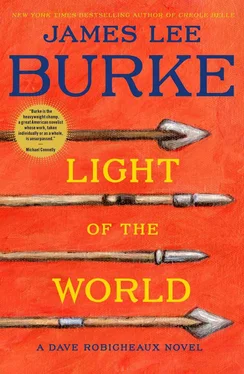“Where’s Caspian?”
“Probably cleaning out his old man’s accounts,” Boyd said.
Surrette’s lips were crimped, his eyes busy with thought, his breathing loud enough to echo in the room.
“Think your meal ticket is about to blow Dodge?” Boyd said.
“What’s that?”
“Nothing,” Boyd replied.
“Where’s Wyatt Dixon?” Surrette said.
“How would I know?” Boyd said. “Who cares? The guy’s nuts.”
“He knows who I am,” Surrette said.
“Everybody knows who you are. What are you talking about?” Boyd said. “Oh, he knows about your mission or whatever? That biblical crap on the cave wall?”
“Take them down to the basement,” Surrette said, breathing through his nose.
Molly was sitting in a chair by the door. She clutched a wadded tissue speckled with blood. “My name is Molly Robicheaux,” she said. “I saw the death squads at work in Guatemala and El Salvador.”
“Is that supposed to mean something to me?” Surrette asked.
“They had your eyes,” she said. “They always smelled of alcohol when they came into the village. They never spoke in any voice except a loud one. They chose their enemies carefully — innocent villagers who had no weapons. You remind me of them.”
“Take them downstairs, Jack, and don’t try to think,” Surrette said. The heat seemed to go out of his face. He smiled. “No judgment calls.”
“Sure,” Boyd said. “I’m with you all the way. You know that.”
“What do you want me to do?” Terry said.
“I’ll tell you when I’m ready. In the meantime, there’s no need for you to speak.”
Albert looked at Boyd and Terry. “I got a question for you fellows,” he said. “Do y’all think this man is going to let you walk away so you can extort him down the road?”
“Asa is a kidder. He knows who his friends are,” Boyd said. “You bet on the wrong horse, old-timer.”
There was a beat. Terry was silent, his concentration turned inward, as though he were examining a flyspeck inside his head.
“Right, Asa?” Jack Boyd said. “Mr. Hollister shouldn’t be placing any bets in Vegas, should he? You got any snacks in the refrigerator? I’m starving.”
We drove back up the two-lane, slowing at the driveways that led down to the houses on the lake or up the hillsides through the cherry orchards. We went over a rise and down a long grade into an unlit area where there were no houses and the shoreline was dense with trees and underbrush. In my high beams, I saw a large rock partially broken on the asphalt. It looked like it had been dragged under a vehicle.
“That wasn’t there when we went up the road earlier,” I said.
“No, it wasn’t,” Clete said. “Pull over.”
I drove around the rock and parked on the north side of it. Gretchen and Alafair pulled in behind me. Up ahead was a dirt road that cut back up the hillside and disappeared inside trees tangled with vines and shrubbery. “Did you guys see this rock earlier?” I said.
“No, it wasn’t here,” Alafair said. She picked it up and set it on the shoulder. “Somebody ran over it. See the powdered spot about ten yards back?”
I took a flashlight from the glove box and walked to a dirt road that angled back up the hill. Stenciled in the dirt were the fresh tire tracks of a heavy vehicle. I shone the flashlight’s beam on a bend about forty yards up the grade. At first I saw only the trees and their shadows moving in the wind; then the beam reflected off a bright surface, perhaps a bumper or a windshield or a strip of chrome.
I walked up the incline. The behemoth-like outline of Albert’s diesel rig, sheathed in dried mud, was unmistakable. Whoever had left it there had backed it up and parked it with the engine pointed downhill. “Up here!” I shouted at the others.
There was nothing in the cab, no keys in the ignition, no signs of a struggle. But I knew my wife. She was not only intelligent and brave, she never went with the flow. I opened both doors of the cab and searched under the seats and behind them and in the glove box. I knew that somewhere, somehow, Molly had left me a message.
“Call it in, Clete,” I said.
“You know what those cocksuckers are going to say, don’t you?” he replied.
“Yeah, I do, but call it in anyway,” I said, feeling down in the seats.
“It’ll take at least a half hour for them to get a guy out here. Then he’ll tell us to file a missing persons report.”
“I know that. Just make the call,” I said.
“Then wait for somebody to show up? I say fuck that.”
I took out my cell phone and started to punch in 911.
“All right, I’ll do it,” Clete said, walking off with his phone to his ear.
I had found nothing in the cab. My heart was beating, my eyes stinging with moisture even though the night was cool. Where are you, Molly? I thought. I stood erect and closed the passenger door. Where could she have left a clue? It’s there someplace, I know it, I know it, I know it. I turned in a circle. On the truck itself, I thought. I shone the flashlight on the door. There it was, right in front of me, two initials on the outside panel. She had probably hung her arm out the window and used her thumb to furrow the letter J, then the letter B, in the muddy splatter that had dried on the panel.
“You were right about Jack Boyd, Gretchen,” I said. “He’s got them. How bad did you work him over?”
“I did as much damage to him as I could in the time that I had,” she answered, holding her eyes on mine.
And Molly will pay the price, I thought.
“Did you say something?” she asked.
“No,” I said.
“They can’t be far away, Dave,” Alafair said.
I wasn’t so sure. Maybe Boyd or Surrette had a boat. Maybe Boyd had gotten past us on a dirt road up the hill. Maybe he had changed vehicles. We needed the state authorities. We needed roadblocks. We needed a police helicopter with a searchlight. We needed all the things I would have had access to as a police officer in the state of Louisiana. Our credibility with the locals was zero.
I had more information in my head than I could think about. Surrette was holed up in a place that had a basement. It was within earshot of a bay where amphibians landed and took off. Someone had held a revival or prayer meeting not far away. But where? The area was full of fruit pickers in the summertime, and they brought their hymnbooks and open-air churches and came and went with the wind.
“The marina,” I said.
“Yeah?” Clete said, flexing his right hand at his side.
“Rich guys own sailboats. They also own amphibians.”
“They don’t necessarily own both,” he replied.
“The marina has a bar. It’s a small one. But it stays open until two,” I said.
“How do you know?” he asked.
Because it’s what I think about all the time. “I saw it when Alafair and I were waterskiing once,” I replied.
It didn’t take us long to get to the marina, but we were running out of options and time. I wished I hadn’t alienated Sheriff Elvis Bisbee. I wished I had not contended with Alafair when she said Surrette had survived the collision of the jail van and the gasoline truck. I wished I had accepted Wyatt Dixon’s belief that Surrette represented a mindless form of evil that seemed to have neither genetic nor environmental origins. I wished I were not so powerless with adversaries like the Youngers and others whose imperious vision of the earth is seldom challenged.
Did I learn anything from sorting through the history of our relationship with Asa Surrette? No, not at all. At a certain point, I would come to a personal conclusion about who he was or who he wasn’t, but it would not be one that I would share. Why is that? Because some things are unknowable, such as the origins of evil.
Читать дальше












